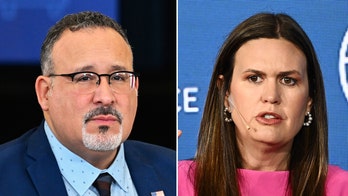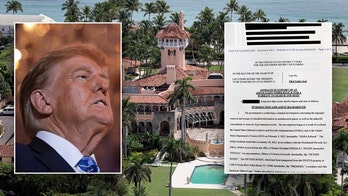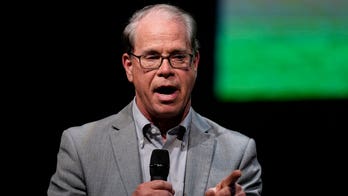This is a story of how the Iowa caucuses can break your heart., even if you're not on the ballot.
It happened in 2004 to Dennis Olson and, politically at least, he's never been the same.
Dennis lives in Urbandale, Iowa, a suburb on the western fringes of Des Moines.
Howard Dean captivated Olson in 2004. Olson told me he's never been so excited by a politician in his life and he threw himself into "Gov. Dean's" candidacy with a joyous ferocity bordering on mania.
And unlike some of the stereotypical Dean supporters - the nose-ringed youngsters who dashed around the state in their blaze orange "Perfect Storm" ski caps - Olson was no starry-eyed idealist . Olson knew the caucus ethic of hard work, grassroots organizing that plowed so deep you not only know the names of your committed caucus-goers, you sought and won multiple commitments from them.
"I talked to people again and again," Olson recalls tenderly now, a small clutch in his throat. "I looked them in the eye. I went over my lists again and again."
Olson knew the caucuses from watching his mother and father caucus in far northern Iowa, back when caucuses in rural areas often occurred in a neighbor's living room (it still happens now, but far less frequently).
Olson also knew well the retail nature of caucus politics and fondly recalls meeting a stranger at an anonymous bowl of potato chips at a meet-and-greet in Iowa City in 1976. Olson was in a side room and saw the chips and began to munch. Moments later so did another guy. The two chatted for awhile about nothing in particular. Then Olson remembers the guy wiping the potato crumbs from his fingers, extending a hand a saying "Hi, my name is Jimmy Carter." Olson remembers leaving Carter behind and thinking, "That guy isn't going anywhere."
Oh well. Olson had it backwards. The guy he thought was going somewhere, Indiana Sen. Birch Bayh (father of current Sen. Evan), went nowhere.
Dean was different. Olson knew he was going somewhere. "I just never felt the way about a politician the way I felt about Dean. He really excited me. He really took me."
Olson signed up as a Precinct Captain for Dean and worked his Democratic neighbors feverishly, taking nothing for granted. Consistent with the requirements of caucus politics, Olson not only obtained multiple commitments, he arranged transportation to the precinct and made Dean available by phone and in his own home for fence-sitters to meet.
"I did everything I could," Olson told me. "I mean, I went back to people, which is what you have to do. I went back and back again. We always kept talking. I kept asking, 'Is there anything I can do?' I arranged phone calls with Gov. Dean if I had to. It wasn't easy. But he was willing. Some people even met him at my house. That's how important it was to him. That's how important it was to me."
Olson did what the Clinton, Obama and Edwards campaigns are doing right now, right this minute and all across the state. They are compiling their supporter lists, nailing down commitments and dividing their labors between finding new caucus supporters and keeping the ones they already have.
Olson did this and he was sure he did it well.
Then caucus night came. And it happened.
In the closing days, the wind began to turn against Dean and suddenly John Kerry began to gain significant momentum. John Edwards gained too. The "Perfect Storm" had begun to spin out of control and suddenly hard-and-fast commitments began to breakaway like loose shingles.
"There were people I had groomed," Olson said. "They attended every rally and the signed the supporter form. There were people who had made a personal commitment and signed the form that they would align for Dean. I remember one who I had Dean go to his house himself to get his commitment. And we got it. But then they started to get caught up in the press and they made the switch. I watched them go to other candidates right before my eyes."
Olson watched Dean's support slip away in his precinct and had a dreadful fear it was happening elsewhere as, indeed, it was. Olson knew his neighbors weren't flighty. dishonest or novices. He understood they were with Dean. Hard. But then something happened and they lost confidence. And then they were gone.
That caucus night left Olson so glum he didn't even stay awake to watch Dean's now infamous "concession" speech.
"I never saw the scream," Olson said. "I was too depressed. I had worked for almost two years and to see it all go away was so hard to deal with. I just didn't feel like watching anything anymore. It took me two days to recover. I can't remember if I cried or not, but I sure felt like crying."
Olson said it's no exaggeration to say the 2004 Iowa caucuses broke his heart and killed off a part of his political being.
"I'm still a part of it," Olson said, referring to this year's caucuses. "But it's not the same. I'll never feel that way again."
Olson is an Edwards organizer and he will serve as his precinct's caucus-night captain, a high-visibility role where he will oversee the caucus itself, enforce the rules and tabulate the results.
Above the fray. That's the only role Olson says he can tolerate this year.
As for his 2004 caucus-night catastrophe, Olson has just one cautionary observation.
"What happened that night will happen to every candidate somewhere."
That doesn't mean any candidate this time will fall as far or as fast as Dean in 2004 (that would be some feat). But it does mean on the night of Jan. 3rd, organizers for every campaign will see what they can't believe -- caucus-goers they were sure would be with them drift into another camp.
And a feeling like betrayal will rise in the pit of their stomach. And it will be all they can do to swallow that welling anger and accept defeat face-to-face. Few things, it seems to me, could be any harder in politics or life.
And that's how the caucuses can break your heart. A break that doesn't easily heal. Just ask Dennis Olson.




